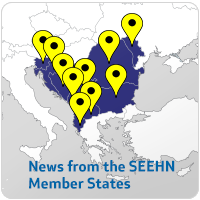“Mental Health and Resilience Training for HCWs responding to COVID-19 in SEE Region” kick-off meeting of the newly launched project took place on 8 November in the virtual space shared by National Focal Points and Mental Health experts from Albania, Bosnia and Herzegovina, Moldova, Montenegro, North Macedonia, Serbia and Kosovo*.
Building on SEEHN Secretariat previous successful collaboration with Project HOPE and applying the training of trainers (TOT) approach, the current project aims to support SEEHN Member States and guests’ efforts to improve the well-being of health workers.
The specific objective focuses on providing deeper knowledge and basic tools and techniques to build more personal resilience and, consequently, to achieve the systemic resilience that our health systems are in critical need of.
Specific actions of this capacity building project include:
1. Involvement of local health authorities and institutions in advocating for the mental health of health workers;
2. Adaptation of HERO-NY training materials to the local context of target project participants by local mental health experts and local health workers; (slides of adapted material)
3. Strengthen the capacity of health workers using HERO-NY adapted material and the Train the Trainers (ToTs) approach to create a group of trainers, eager to disseminate the information of their colleagues and exponentially increase the coverage of this training;
4. Providing cascading sessions to other health workers.
This project is developed and implemented by the SEEHN Secretariat and is funded by Project HOPE. It is expected to reach up to 8000 healthcare workers in the SEE region.
The training sessions will address key concepts of stress, trauma and resilience, with specific reference to:
- Personal and professional wellness
- Impact, effect & outcome on HCWs
- Seeking help for ourselves & others
- Resilience & wellness program development.
Dr. Mira Dasic, Director of the SEEHN Secretariat, welcomed the participants at the kick-off meeting and emphasized in her opening remarks the devastating impact of the pandemic on mental health, with a focus on regional inequities. “The COVID-19 pandemic continues with different speed and another wave is escalating. At the same time, the mental health toll is in continuous rise and it is expected to last as a global phenomenon. The South Eastern Europe Region is a fragile region where during the pandemic increased the inequality gap and mental health issues are surging.” She stated in her intervention. The virtual session included a presentation of the training program and a review on the latest data within the research area. Exploratory discussions were held with participants on the project outline (objectives, activities, and dynamics) and their expectations regarding the outcome of the project.






